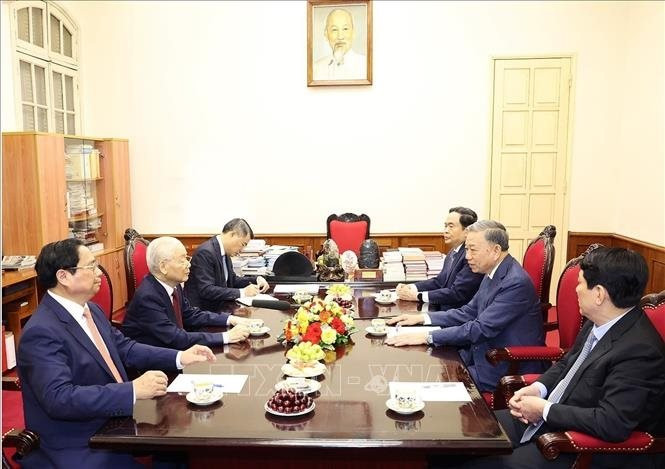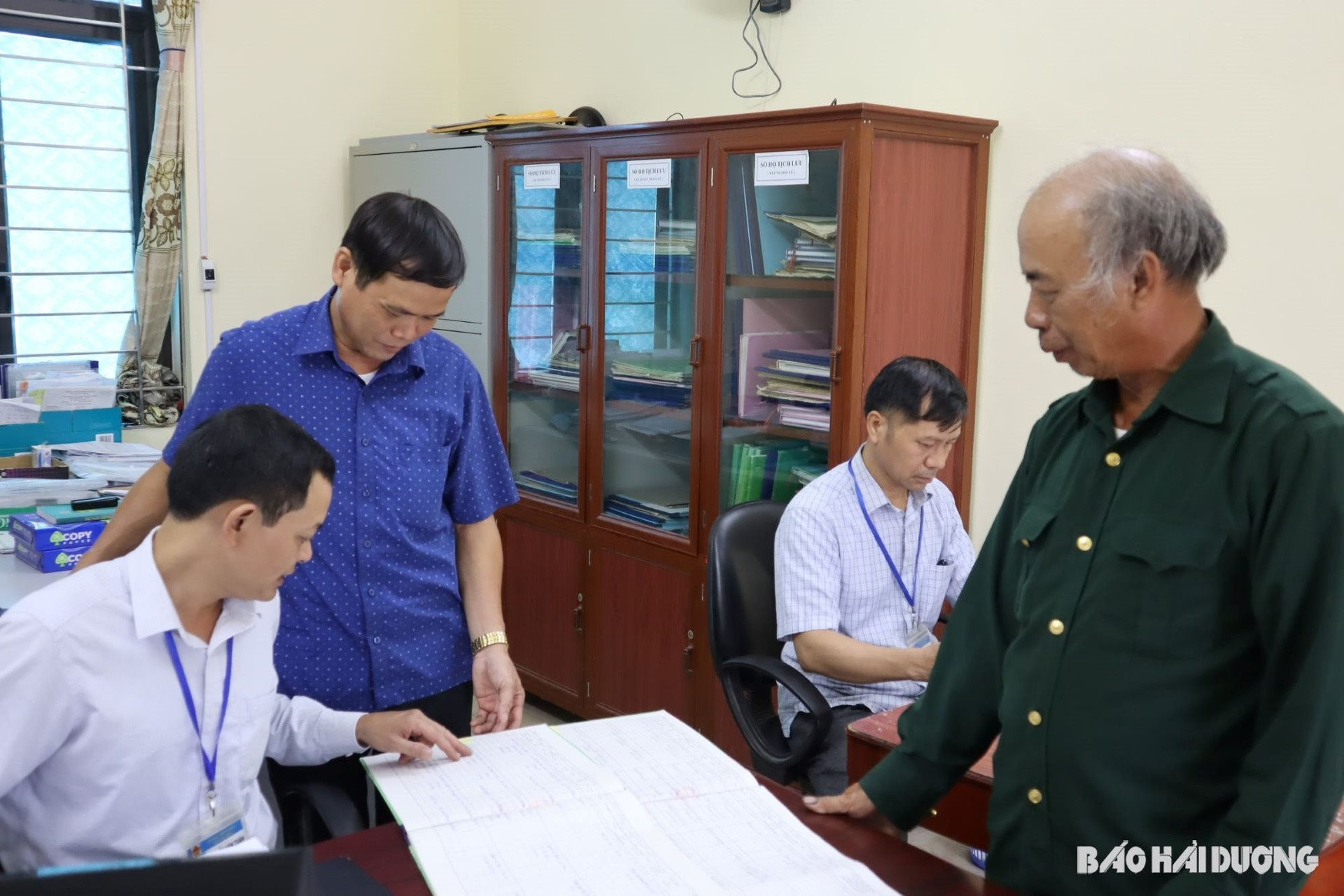“Cadres are the root of all work”, all success or failure depends on cadre work, especially the team of leaders at all levels. Our Party always pays attention to building a solid “root”, so as not to be shaken by storms and tempests, to create a foundation for development. Preparing cadres for Party Congresses at all levels for the 2025-2030 term, towards the 14th National Party Congress is extremely important, deciding the survival of the Party.

Cultivate the "roots" to create a solid foundation
We know that Ho Chi Minh's thoughts on cadre work and cadres were formed very early, supplemented, developed, and perfected to suit the conditions and practical circumstances in each stage of the Vietnamese revolution. He repeatedly emphasized that "cadres are the root of all work" and advised cadres: "We must understand that government agencies from the whole country to the villages are all servants of the people, meaning they are meant to shoulder the common work of the people, not to oppress the people as in the period under French and Japanese rule. Whatever is beneficial to the people, we must do our best to do it. Whatever is harmful to the people, we must avoid at all costs. We must love and respect the people, then the people will love and respect us."
In particular, he always paid attention to training cadres, preventing them from going down the path of corruption, waste, and bureaucracy - extremely dangerous "internal invaders" that destroy the country from within. He considered the use of cadres a fundamental content of science and art in the Party's cadre work. Using the right person for the right job, respecting talent, respecting cadres, respecting intellectuals, and respecting each person who is useful to the common work are essential issues that determine success or failure. He also pointed out basic methods in using cadres, which are: Directing, improving, inspecting, reforming, and helping with very brief and specific instructions. In particular, regarding direction, President Ho Chi Minh believed that it was necessary to let them do their work, let them take responsibility, and not be afraid of making even a small mistake. But we must always, depending on the circumstances, show them the direction of work and the way of working, so that they can develop their capacity and initiative in accordance with the Party's guidelines and the State's laws.
Thus, it can be clearly seen that the Politburo's issuance of 3 regulations related to personnel work within 1 month, especially regulations 142 and 148 related to leaders, is the acceptance and creative development of our Party in the basic method of using cadres according to Ho Chi Minh's thought, suitable to the current context and situation. Regulation 148 stipulates very specifically the authority of the leader in temporarily suspending the work of subordinate cadres in necessary cases or when there are signs of serious violations of Party regulations and State laws. The grounds for temporary suspension of work in necessary cases are: Cadres have violated moral qualities and lifestyle, causing negative impacts, public outrage, and adversely affecting the reputation of organizations and individuals; cadres deliberately delay, push back, avoid responsibility, and do not perform work under their authority according to assigned functions and tasks; Officials who have corrupt, negative behavior, causing trouble for people, businesses, agencies, organizations in the process of performing public duties...
This clearly demonstrates that “prevention is better than cure”, causing less harm to the organization. This also clearly shows that correcting and rectifying mistakes in personnel work is a regular and completely normal thing, in order to have a team of cadres with enough heart, vision, and talent, who are truly servants of the people. Because, after all, as President Ho Chi Minh affirmed: “All successes or failures are due to good or bad cadres”. And cultivating the “roots” to create a solid foundation, gradually forming and building a team of cadres that ensure quality, possessing revolutionary moral qualities suitable to specific conditions is the necessary and important condition for the work to be successful. Cultivating the “roots”, therefore, is increasingly contributing positively to the work of building and rectifying the Party in a practical and effective way, suitable to the context and situation in the country as well as in the world.

Increase power but do not abuse power for personal purposes
Throughout the content of the 3 Regulations 142, 144 and 148 issued within exactly 1 month, the purpose can be clearly seen, just as President Ho Chi Minh instructed: "Our Party is a ruling party, each Party member and cadre must be truly imbued with revolutionary ethics, truly diligent, frugal, honest, impartial and selfless. We must keep our Party truly clean, worthy of being a leader, a truly loyal servant of the people".
In the context of limitations and weaknesses in personnel work, there are many cadres who have degraded their revolutionary ideology and ethics, "self-evolved", "self-transformed", abused their power, degraded, bureaucratic, corrupt, and cultivated personal and group interests, the promulgation of regulations on personnel work, related to all cadres and party members, is extremely necessary. Specifically, with Regulation 144, the implementation needs to be carried out extensively to the Party cells, that is, to all more than 5.3 million Party members and nearly 52,000 grassroots Party organizations. This can be considered a widespread political activity, reminding each Party member and cadre to understand, thoroughly grasp, and well implement the revolutionary ethical standards to which they themselves have related obligations. Party cells and grassroots Party organizations need to organize thematic activities in a timely, practical, and effective manner.
With Regulation 142 on piloting the delegation of power and responsibility to leaders in personnel work, many experts believe that this creates more transparency and fairness in personnel work, while controlling power and preventing corruption and negativity in personnel work, avoiding the situation of running for positions, running for power, running for rotation... The regulation also emphasizes the responsibility of leaders in selecting their deputies based on the respect for talented people, upright people who dare to express their opinions, correct criticism, for the collective; people who dare to think, dare to do, dare to take responsibility... Only then, the selection of subordinates needs to be fair, public, for the common good, to have a good, united leadership team, with enough capacity, qualifications, and prestige before the collective. Of course, when being delegated authority, the leader must also be responsible for introducing personnel, even when they have transferred jobs or retired.
That means there can be no “safe landing”, “live or die as you please”, or be innocent about introducing one’s own personnel. Attaching responsibility to the rights and obligations of the leader is also to make the leader more responsible in controlling his subordinates, avoiding mistakes, violations, and violations of the law. This is even more necessary in the context that in recent times, many high-ranking leaders have had to receive Party discipline for being responsible for letting their subordinates violate shortcomings, make mistakes, violate the law, commit corruption... seriously affecting the prestige of the Party, causing the loss of trust of cadres, party members, and people in the leadership of the Party and the State...
While Regulation 142 increases the power of the head in selecting his/her direct deputy, Regulation 148 increases the power of the head in temporarily suspending work, helping to strengthen Party discipline and order; contributing to cleaning up and improving the effectiveness and efficiency of the State apparatus. Specifically, cadres who deliberately delay, push back, avoid responsibility, or do not perform assigned tasks, causing work to be delayed or interrupted, will be dealt with by the head and temporarily suspended from work, so that the operation of the apparatus is smooth, uninterrupted, ensuring progress and efficiency. This also means that the head must be brave, objective, fair, clear, and not afraid of collision in implementing the enhanced powers. This is true for both Regulations 142 and 148, and is closely linked to the responsibility of the head. That is to choose the right person, who best meets the position and requirements of the job; On the other hand, it is also about identifying and preventing possible violations that could weaken the Party organization and apparatus. Of course, both of these regulations strictly prohibit the abuse of increased power, for personal, local, and group interests.
It can be affirmed that the promulgation of 3 extremely important regulations related to personnel work within just 1 month with extremely concise, specific, easy-to-remember, easy-to-implement contents is a breakthrough of our Party, inheriting the Party's ideological foundation of Marxism-Leninism, Ho Chi Minh's thought on personnel work and cadres, suitable to the new context and conditions. To conclude this series of articles, it is necessary to emphasize once again that our Party always considers personnel work as the "root of all work", always self-reflecting, self-correcting in every revolutionary stage, specific situations and contexts to cultivate, build, and build a solid "root", to avoid by all means the disasters that lead to the Party's decline.
NGUYEN TRI THUC, Member of the Editorial Board, Head of the Special Topics and Special Editions Department of Communist Magazine